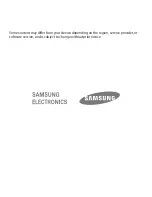29
Battery use
Always use batteries recommended by
your hearing care professional. Low quality
batteries may leak and cause bodily harm.
Never attempt to recharge your batteries,
and never dispose of batteries by burning
them. There is a risk that the batteries will
explode.
Dysfunction
Be aware of the possibility that your trans-
mitter may stop working without notice.
Keep this in mind when you depend on
warning sounds (e.g. when you are in traf-
fic). The transmitter may stop functioning,
for instance if the batteries have expired.
Active implants
The transmitter has been thoroughly
tested and characterised for human health
according to international standards for
human exposure (Specific Absorption Ratio
- SAR), induced electromagnetic power and
voltages into the human body.
The exposure values are well below
international accepted safety limits for
SAR, induced electromagnetic power and
voltages into the human body defined in
the standards for human health and coex-
istence with active medical implants, such
as pacemakers and heart defibrillators.
If you have an active brain implant, please
contact the manufacturer of your implanta-
ble device for information about the risk of
disturbance.
The MultiTool which has a built-in magnet
should be kept at least 30 cm away from
the implant, e.g. do not carry it in your
breast pocket.
In general, please follow the guidelines
recommended by the manufacturers of
implantable defibrillators and pacemakers
on use with magnets.
Continues on next page
Summary of Contents for CROS miniRITE T
Page 1: ...Instructions for use miniRITE T Oticon CROS...
Page 2: ...239875CA US 2021 07 19 v1 Oticon CROS Firmware 1 0...
Page 9: ...9 Hearing aid Transmitter Sound transmission...
Page 44: ...0000210158000001 Mode d emploi miniRITE T Oticon CROS...
Page 45: ...239875CA FR 2021 07 19 v1 Oticon CROS Firmware 1 0...


















